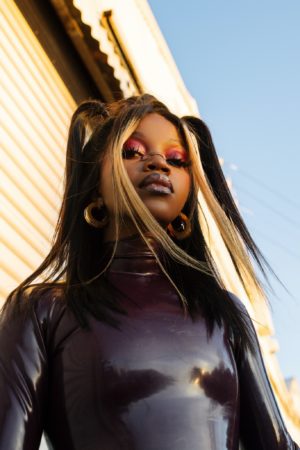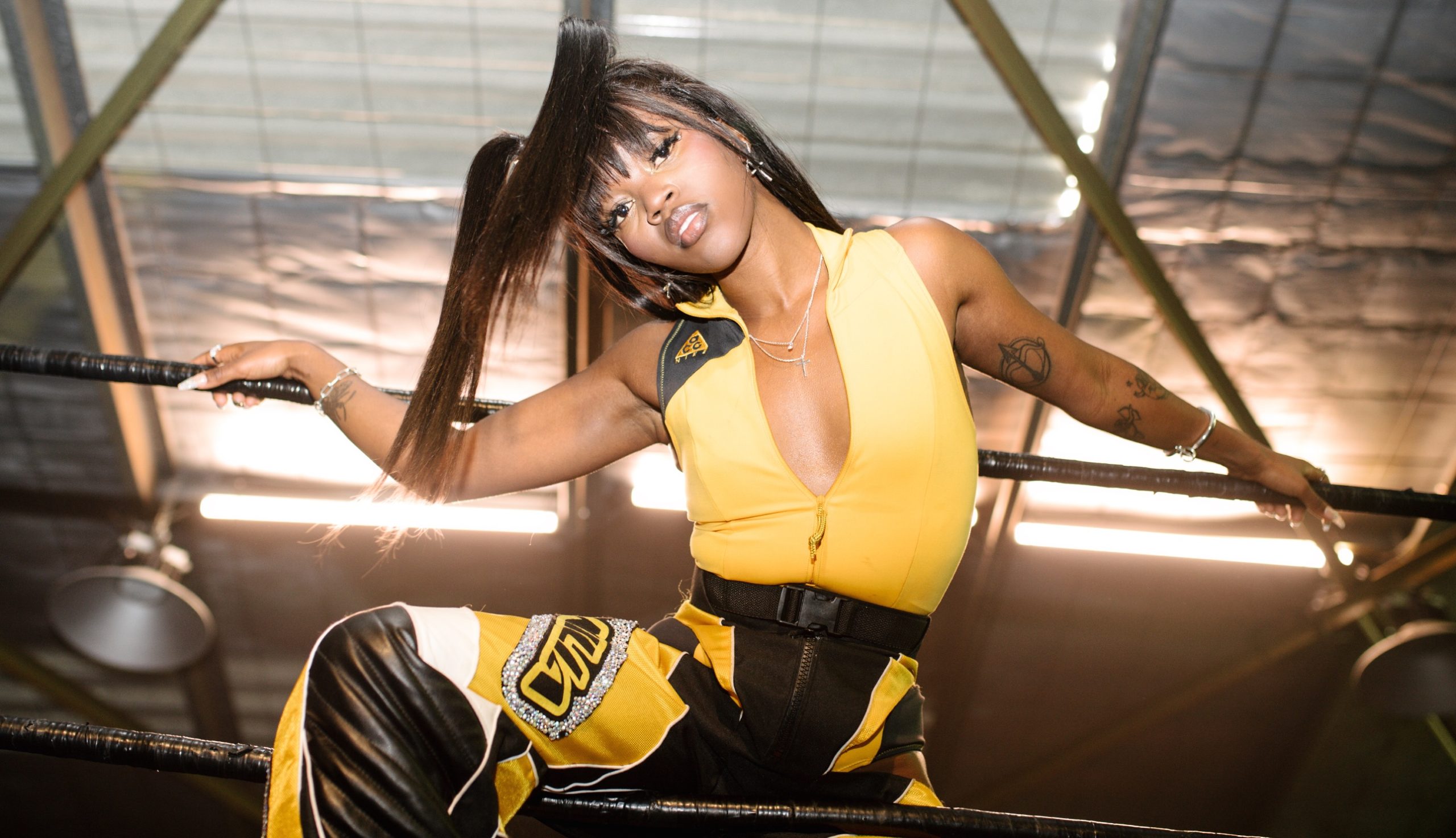Tkay Maidza creates different galaxies within her music. Her latest project, Last Year Was Weird, a collection of three EPs released across a four-year span, came to completion a couple weeks ago with the reveal of its final installation. The series began as a way for listeners and the artist herself to understand who Tkay Maidza is. The conclusion is a personality that’s both vulnerable and ready for battle; someone who would swim in a pool of flowers and also morph into a boss-bitch nymph; someone who embodies both the spirit of Lil’ Kim and Kim Possible.
From her home in Los Angeles, Maidza tells me over Zoom about how each EP strengthened her story. “In the beginning, I wouldn’t have imagined it being what it is now. But when we were finishing the first EP, there’s always songs left over and you’re like, ‘Oh, I hope it makes the next one,’ or there are songs that we made for the first EP that are in the third one,” she says. Outside of having three volumes, there weren’t any guidelines for the process outside of following her intuition.
Last Year Was Weird started as a way to break outside the depressing parameters of the music industry and ended as a canvas for Maidza to show us her multiverse, one beyond genre and one definitely out of this world. The series has evolved from a project of grief and an attempt to accept the trials of this fucked up world into a vivid, career-defining odyssey proving a bright future for Maidza. It’s exactly where the last EP leaves us. “It feels like you’re looking ahead and not actually looking behind, which is what I like most about it,” she says.
In the conversation below, we get into the different universes of Last Year Was Weird, her interest in manifestation, and the significance of flowers in her work.
Are these EPs all inhabiting the same world? Do you look at them as three projects that exist in different places and times?
They happen in different times, but each project has different universes in them. The soft songs…I will call them the “Flower Universe.” And then when you have the hard rap songs, that’s more like “Mad Max Universe.” And then there’s “The Club,” which is songs like “Shook” and “Syrup” and “24K.” You can playlist these universes and they sound cohesive. It’s building the story and making sure you cover each world as you go along. But they’re all about different times of my life, so that’s how I was seeing it, covering each base.
Your visuals are so integral to your music and the story. I’m curious if it’s a chicken-or-the-egg kind of thing?
The song comes first. But to me, the visual has to represent the song. I immerse myself in it like, what does the song mean? What are the lyrics, and how can I connect it visually so it feels vivid and really represents what I’m trying to convey? My favorite artists make amazing songs, but the videos will make them so much better, because you’re like, “Oh, that’s exactly what I imagined when I heard it.” I think it’s also that whole thing of having the Flower Universe. If you see an artwork that has flowers and looks very bright and colorful, you kind of already know what you’re going to get with that, even if you don’t really know what to expect from me. There’s a clue in what colors are in the artwork.
“I feel like when you say someone’s ‘weird,’ or something is ‘weird,’ you don’t have control over it. I think it’s changed, but with releasing new music it feels like it’s taken a new shape and it’s being claimed as something that belongs to everyone else now. To me, it’s like I should embrace the awkwardness, because it’s not just me going through it anymore. It’s everyone.”
Speaking of the covers, the last two are so striking. You’re this warrior riding these intense vehicles.
When I was thinking of 2, I had this thought that I wanted the cover to be me on a motorbike in the desert, and somehow futuristic. It was meant to be like a futuristic Renaissance painting. I think for the next one I wanted to have that feeling of strength, but also upgrading. So I thought moving on to a Mad Max car, but putting it in a garden would give the good juxtaposition of, “She’s hard and she’s going to go for it, but she’s still soft, and she’s still trying to figure it out, but there’s more strength to it.” I think that’s what the cover looks like. It’s very delicate. But then when you look at the car, it’s like, “No one talk to me, don’t cross me.” [Laughs.]
I’ve read about how the title Last Year Was Weird came about, but I’m interested in how that title has changed for you and your relationship to the word “weird.”
I had a lot of experiences where they were more grim, and I didn’t know the word to pinpoint that feeling. It was just an accumulation of experiences where you could almost laugh at how painful it was for me. I feel like when you say someone’s “weird,” or something is “weird,” you don’t have control over it. It feels really awkward, and you can’t avoid it for some reason. I think it’s changed, but with releasing new music it feels like it’s taken a new shape and it’s being claimed as something that belongs to everyone else now. To me, it’s like I should embrace the awkwardness, because it’s not just me going through it anymore. It’s everyone.

I was thinking in terms of your music—the second EP shows a much more fun and intense personality, and then the third gets even more confident and fun with “Kim” and “Syrup” and their visuals.
I think a lot of this feels more personal because I remember when I wrote “Kim,” it just came from a point of view of “I love Kim Possible, let me write a song as if I’m her, but I’m going to say anything and everything that’s trashy because it’s funny.” But then almost six months later, I saw this whole resurgence of Kim Possible. With “Syrup,” I’m obsessed with Transformers, Optimus Prime, and I’m more interested in rapping about prophecies and all that stuff. It made more sense to do that instead of trying to mold myself in a certain way. There wasn’t any overthinking because it was kind of already proved with Last Year Was Weird 1 and 2 that I should embrace what makes me strange and different.
I read that you were making these EPs to get a better understanding of yourself and what to do for the album. Do you have a clearer picture?
Yeah, I definitely know what I need to do next. It’s going to be a continuation of these EPs. The next thing I need to do is find that consistency. I think it’s been a good face for people to be like, “Oh, I understand her.” I felt like no one really understood what I was going for beforehand. I just understand what the parameters of where I can move are, and how to improve things now because there’s a past that shows where I’m coming from now, instead of making a song and then never seeing that producer ever again.
“I’m always trying to mediate myself to fit into different circumstances, and that can cause a bit of an internal conflict. Alright, which one am I showing? Is this the right one for this situation? ”
Do you think you’re still gonna use a lot of like collaborations for that?
Definitely. But I think there’s more accuracy of who I need to look for to work on stuff. With Last Year Was Weird 3, Two Fresh, who co-produced “Onto Me”—I had known them for two years before we made that song. So it was like, “We should actually go into the studio for once,” and that felt natural. I felt safe and there was no judgment. I think that’s where the best music is made. I’m really shy, or I guess weird or awkward, when I go into studio sessions. You can make a lot of amazing songs, but if the experience is bad, then it’s like, where do you go from that? Would you want to go back to it? Would the other person want to go back to it again? I don’t know. It’s like dating. [Laughs.]
It’s interesting that you describe yourself as shy. Especially, because on the new EP—I forget which song it is—you talk about yourself as being obnoxious or something.
I think if I’m around my friends, I’m the worst person to be around because I’m loud and annoying. I think I’m introverted, but I’m not afraid to go out and be myself at the same time. There’s always this overarching feeling if I go out and I’m wearing something I feel confident in, I’ll be like, “Oh my god, Am I standing out and being too flashy even though I’m not talking to anyone?”
I’ve had a lot of different periods in my life where I’d go to one school and choose not to stand out, and then I might go to the next school and I’m playing sports and I have to do music so I’m more extroverted. Then I go to the next one, I’m like, “Oh my God, I can’t be bothered speaking to anyone again.” It’s like a Hannah Montana thing: One minute you’re blending in here, but then I’m going to tennis training and I’m being loud and annoying, and everyone’s like, “You’re not like that at school.” Then we go back to school and I’m like, “Ope, I don’t exist here again!” I’m always trying to mediate myself to fit into different circumstances, and that can cause a bit of an internal conflict. Alright, which one am I showing? Is this the right one for this situation?
One more question I’m really interested in because it comes up across all the EPs is about the visual of a flower. Where did that love of the image come from?
I feel like it became a big part of the visual identity when we filmed the “White Rose” video. I was like, “Why do I keep making songs about flowers? What does that mean to me?” I think it was a symbol of love, like personal healing, but also problems. A flower has a life cycle. It blooms, it grows, and then it wilts. But there’s more flowers growing, and there’s a sense of light and purity and detoxification that comes with having flowers in your house. I felt like this was an important thing to have across the EPs because it felt like there was always light being spread across them. If I didn’t have it then I didn’t feel like it completed me.
“My Flowers” is about going through a lot, having good things in your life—I’m like, “Why is it so hard for me to lie, but easy for me to buy something else?” Some things are hard, some things are different, but it’s a bouquet of flowers that makes me who I am. There’s good flowers and bad flowers, but all together it looks beautiful. FL









